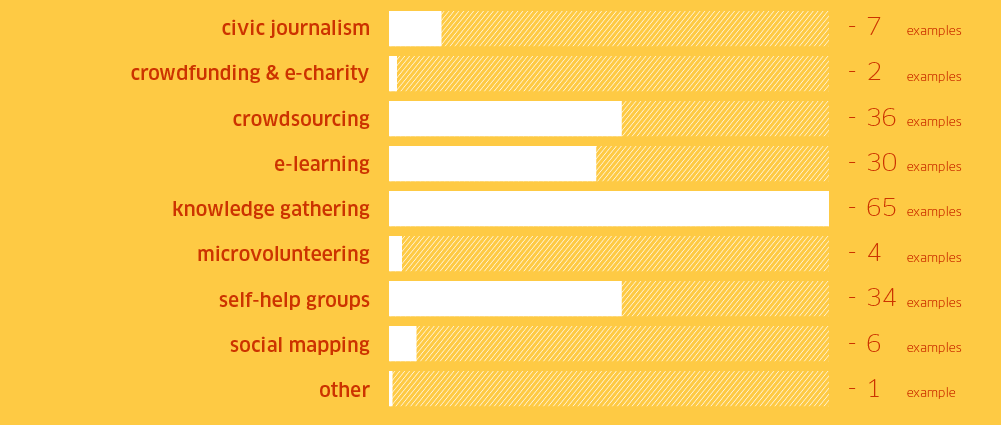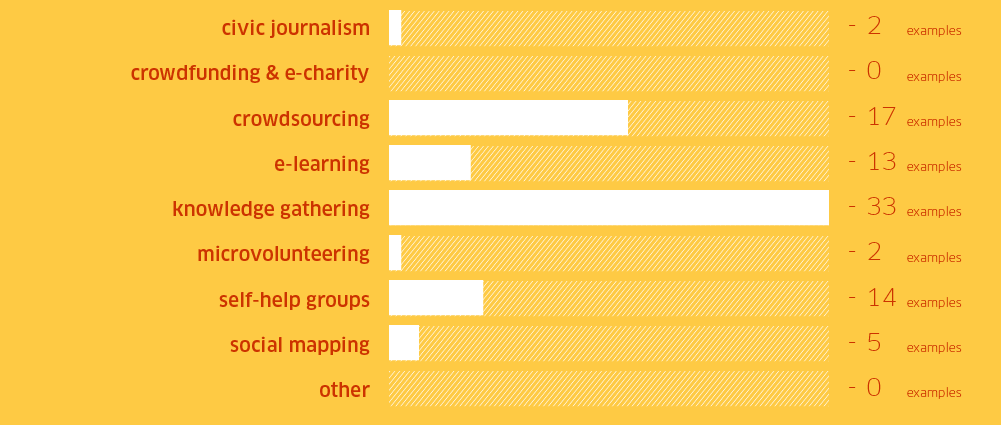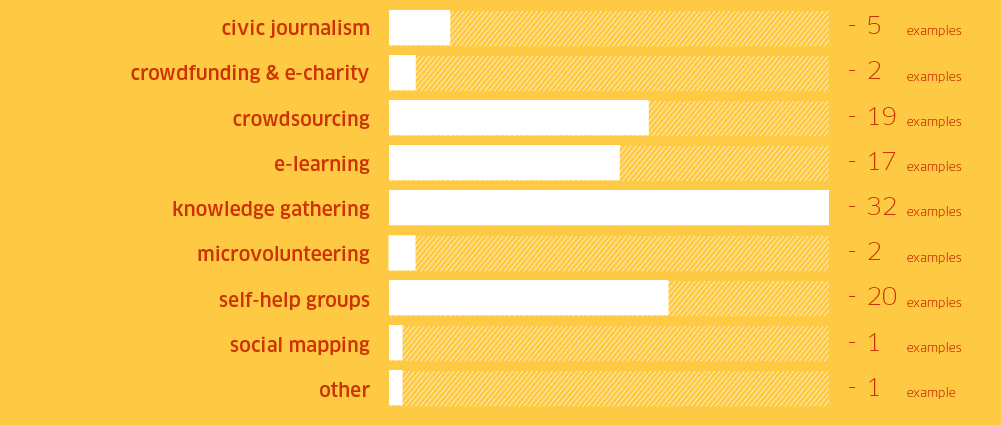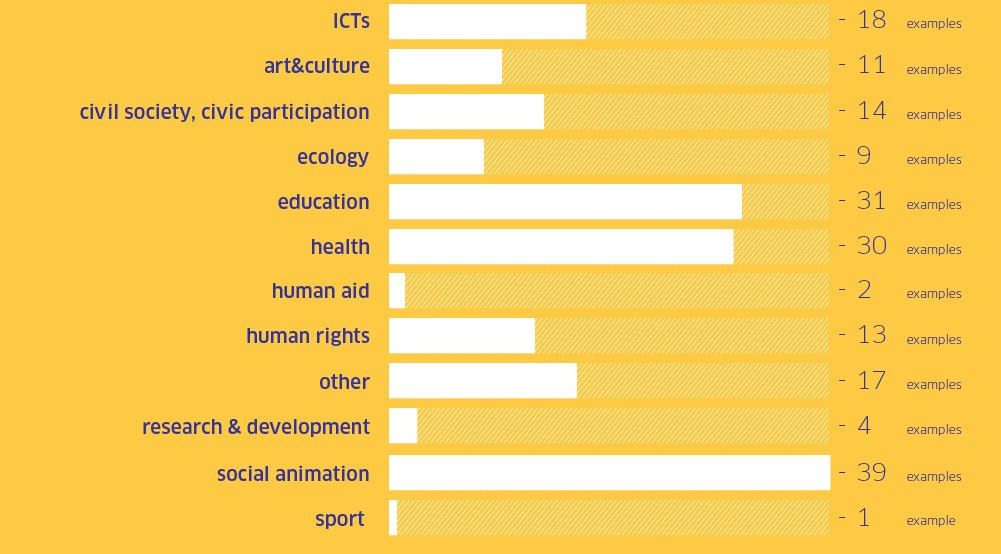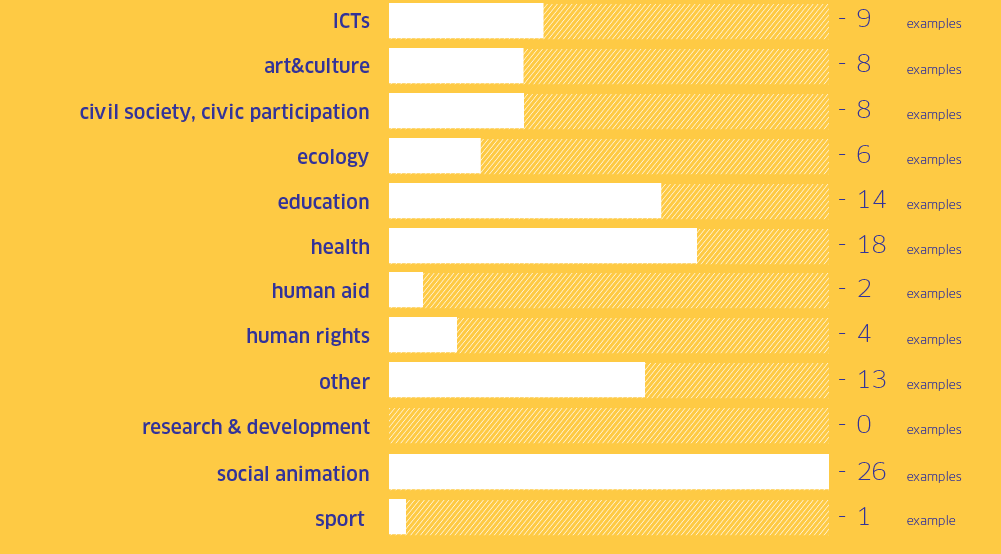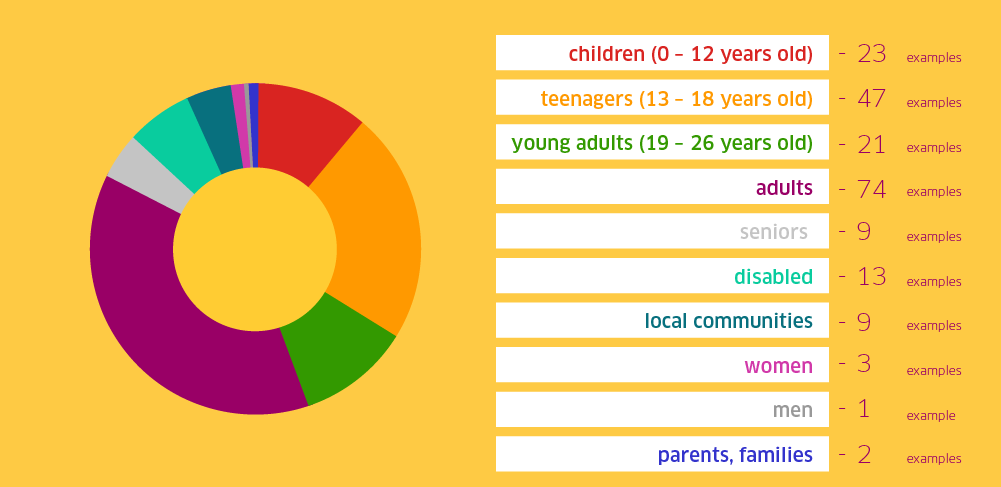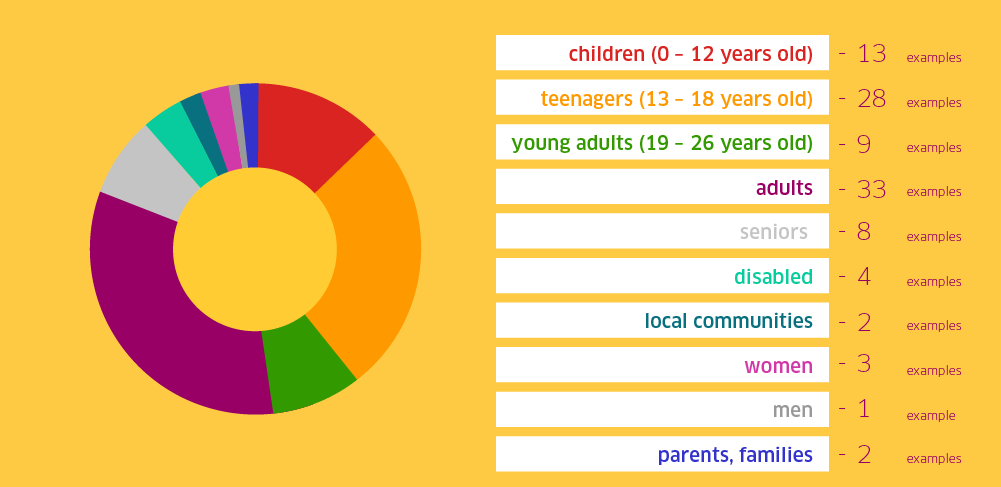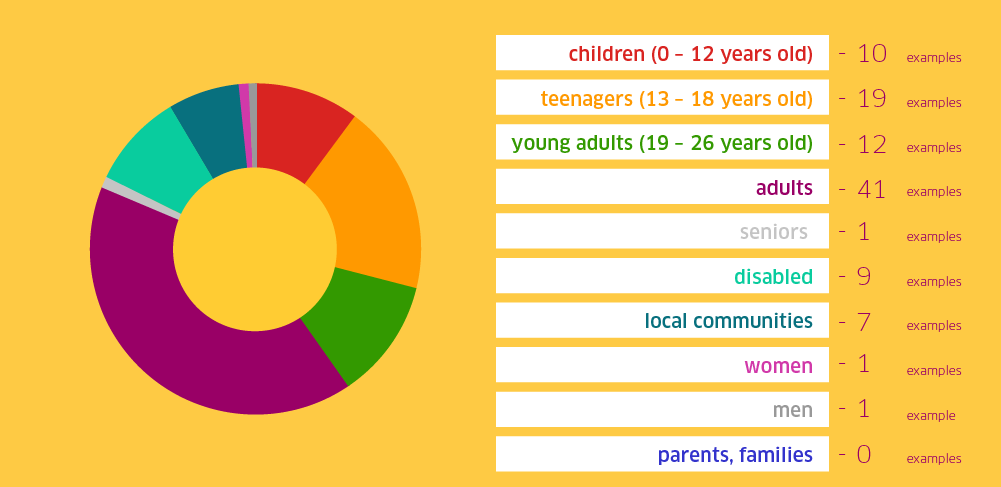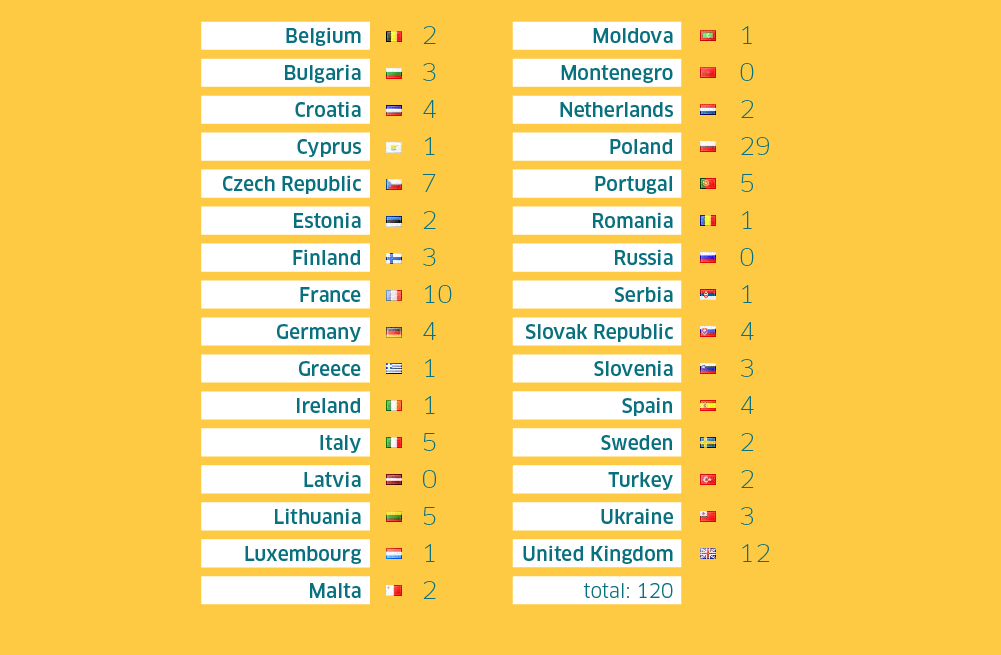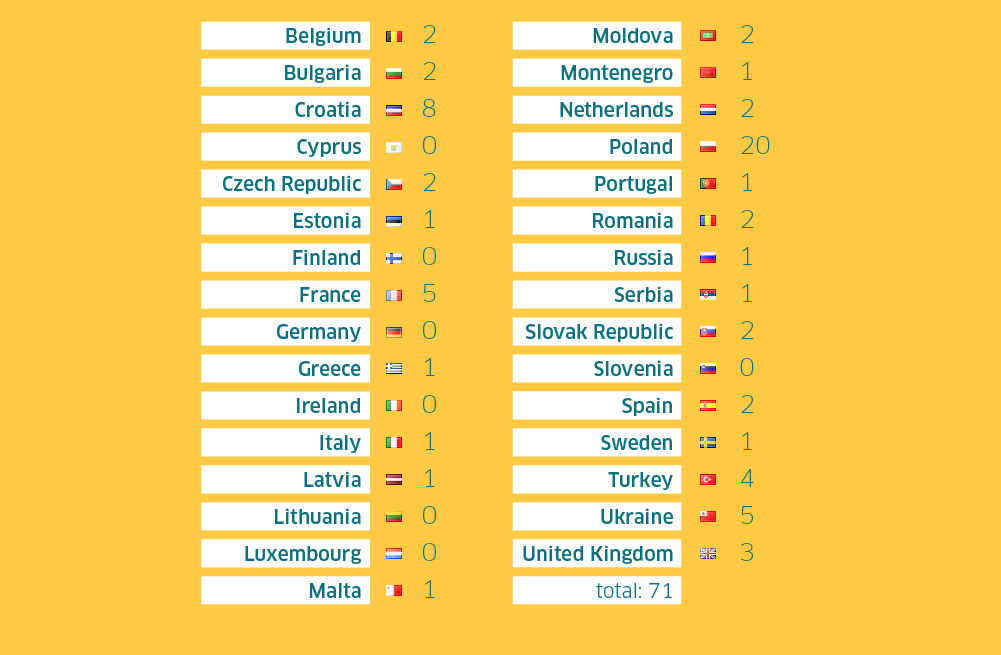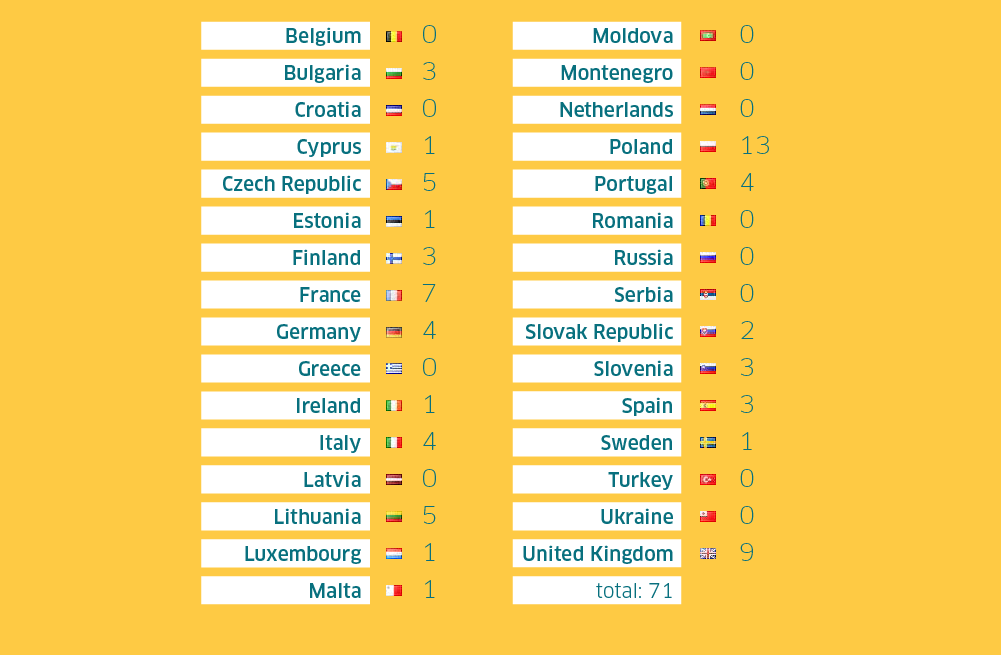CROWDFUNDING AND E-CHARITY
Crowdfunding encompasses projects aiming to collect funds for a specified goal through the so-called “crowd”, which is a large, dispersed group of individuals contributing small amounts of money. Although the idea of crowdfunding has been known for many years now, nowadays it takes place on various Internet platforms used by organizations and individuals to raise funds needed to solve certain problems or achieve important goals.
Example
Thanks to the contest “Odkryj e-wolontariat” we’ve learnt the following portals:
SiePomaga.pl
It’s an Internet platform by means of which one can support numerous charity projects.
Ludzie-Serca.pl
This portal serves as a meeting place for e-volunteers who actively help parents of sick children out by: putting them in touch with clinics in Poland and other countries across the world, translating documents, writing appeals, designing posters and flyers, contacting the media, promoting the issue of helping and organizing financial support and aid in kind (food parcels, school kits, clothing).
Search for more examples: http://www.e-wolontariat.pl/dobre-praktyki-filtr
What do e-volunteers do?
They create and post advertisements of charity events; they promote various initiatives on the Internet by sending out information to the media or posting it on social networking sites; they seek out potential benefactors, and also make donations.
Who are e-volunteers?
E-charity is most often supported by adults wishing to aid certain charity projects.
CROWDSOURCING:
Refers to benefiting from “talents of the crowd”, in other words it is an exchange of knowledge and experiences, a process of creating something new as well as problem solving distributed to a large, scattered group of people. It is “brainstorming 2.0” - successfully used by companies seeking, for instance, opinions about introducing a new product into the market, by research institutes conducting wide scale research, or by NGOs running projects with participation of Internet users. The biggest advantage of crowdsourcing is the possibility to ask for opinions of people with different experiences, skills and views – in this way it is easier to find the best idea or solution.
Example
BrightWorks, BrightOne
A micro-volunteering Web app that allows charities and nonprofits to get projects and tasks completed for free online by a global volunteer community, in an effective, simple-to-use, and easy-to-get-started way.
Radioactive@Home
A nonprofit scientific project whose aim is to persuade the public opinion that radioactivity is omnipresent yet not always dangerous. How does it work? Users – e-volunteers hook radiation sensors up to their computer, then install a software that sends data from radiation sensors to main server. The server itself as well as Website created with free Internet tools, are both supported by e-volunteers. They process and make collected data available. Access to data is possible thanks to user friendly map published on www.radioactiveathome.org/map/.
Search for more examples: http://www.e-wolontariat.pl/dobre-praktyki-filtr
What do e-volunteers do in such projects?
They share their knowledge, answer the questions, comment and verify the answers of other people, solve the problems, compare their solutions with solutions of others, they also deal with small tasks, which are a part of bigger project (aka microtasking) and give specialist support.
Who are e-volunteers?
E-volunteers are people interested in discussed topic, regardless of age, gender, and self-interests. Together they find answers for questions from Internet forums or crowdsourcing sites, they also frequently come up with completely new ideas!
CITIZEN JOURNALISM:
Citizen journalism encompasses projects carried out by citizens. In this way they can take part in determining the way local and nationwide media functions. A citizen journalist is able to comment on the events taking place in their environment, to publish reports on-line, and to upload photos and video materials. In Poland, local news portals created by residents, as well as nationwide portals, are steadily gaining popularity, mainly because every citizen has a chance to inform others about current Polish issues thanks to these portals.
Example
Our Town - to Know It is to Love It, Center of Technical Culture Rijeka
Our Town - to Know It is to Love It, Center of Technical Culture Rijeka. The project represents a mean of connecting and activating people at different ages, with special emphasis on socially excluded groups (such as seniors, children and youth). Walking tours around Rijeka are organized monthly with the goal of familiarizing the public with the rich, but often neglected, town's cultural heritage. At the same time they are tied to journalism, photography and video production workshops, providing the attendants with the chance to use their skills in practice. Photos, reports and videos covering the walks are published in e-newspaper Rijeka-in, as well as in a specially formed e-club, a virtual platform for sharing multimedia materials as well as knowledge and experiences about Rijeka and its heritage, for all those included in the project.
Radio IN
“Radio IN” started to broadcast in 2010; now its content is being delivered by a dozen or so e-volunteers with various disabilities, who come from different parts of Poland. This project enables them to share their passions with others and to produce interesting broadcasts at the same time.
Foksal Eleven – Internet Television
“Foksal Eleven” is an on-line TV station creating social, cultural and metapolitical content. Its founders are especially interested in daily problems of the society. The editors and materials are created by e-volunteers.
Search for more examples: http://www.e-wolontariat.pl/dobre-praktyki-filtr
What do e-volunteers do in such projects?
They describe reality – they search for interesting topics, create informative materials, such as: articles, graphics, audio/video materials, conduct interviews, encourage others to voice their opinions, moderate news service portals.
Who are e-volunteers?
E-volunteering is being supported by people interested in journalism or those who simply care about various events happening in their environment. They want to be able to affect the reality, comment on it, and to give others a chance to express their views. They share a common goal, i.e. having positive influence on their local communities.
E-LEARNING:
E-learning means: education via the Internet. Thanks to e-learning, knowledge can be gained outside of school, and appeals to people by being presented in an interesting and accessible form. New technologies enable us to teach others and to learn without leaving our homes. The most prominent examples are: e-learning courses, asking experts for advice, or the exchange of personal experiences between Internet users.
Example
Kolibri for all, L'enfant @ l'hôpital
Kolibri gives sick children in hospital or children living in difficult conditions the opportunity to meet with outstanding men and women, like explorers, architects, etymologists, scientists, musicians, who, thanks to the creative usage of new technologies, stimulate their education and development.
Dawca.pl, Polskie Towarzystwo Programów Zdrowotnych
The Cybervolunteers Foundation uses technologies from a social perspective and contributes to the elimination of other gaps through awareness, information and training online, onsite and a mix of both, satisfying the needs of each individual or social group which they work with. To reach it, they conform and adapt a variety of applications, tools and technology contents for all the needs excluded people may have!
Cibervoluntarios, Fundación Cibervoluntarios
An initiative to help the most talented students in Lithuania develop their skills and achieve success in education, independently of their social and economical status. In addition to the regular online learning and individual counseling, on-site sessions are organised three time a year, where students attend high-quality subject and personal development classes.
Nacionaline Moksleiviu Akademija
An initiative to help the most talented students in Lithuania develop their skills and achieve success in education, independently of their social and economical status. In addition to the regular online learning and individual counseling, on-site sessions are organised three time a year, where students attend high-quality subject and personal development classes.
Search for more examples: http://www.e-wolontariat.pl/dobre-praktyki-filtr
What do e-volunteers do in such projects?
They give private lessons on-line – they share their knowledge from various fields, help others out with learning, e.g. by means of instant messaging clients, forums or Web conferencing (Webinars).
They co-organize e-learning courses – they create content (texts, graphics, video/audio materials), program and promote.
Who are e-volunteers?
E-volunteering is supported by: the youth, students, teachers, enthusiasts and experts in various fields. These people share their knowledge, which can help others overcome difficulties (not only educational difficulties).
KNOWLEDGE GATHERING:
The Internet is a great database of knowledge – where you can find information about almost anything! Professionals like: financiers, IT, graphic artists, mathematicians, humanists and many others share their knowledge by posting articles, notes, comments or on-line debates. Contrary to the popular belief of some, the knowledge gathered on the Internet can be as professional as knowledge gathered in encyclopedias - there are teams of moderators on many portals ensuring the reliability of posted information. The knowledge gathering type of e-volunteering is about creating sources of common knowledge, free encyclopedias, blogs, portals, etc.
Example
Candidates 2011, Stowarzyszenie 2011
Project "Candidates 2011" was created to raise awareness among Polish society about conscious voting in parliamentary elections. A team of e-volunteers from all over the country contacted candidates to Polish parliament and encouraged them to fill in questionnaires about their experience and political views on important issues.
All of the questionnaires were uploaded to the http://www.mamprawowiedziec.pl Website, so the Polish voters were able to read them and decide consciously to whom give their vote in parliamentary elections.
Braille in the Internet age, Groupement des Intellectuels Aveugles ou Amblyopes (GIAA)
Providing visually impaired people access to reading and culture by translating books to the Braille system. E-volunteers write materials for the blind using a specially created word processor. First, they cut the original text and scan it. Then they have to correct errors and format the text. After that there’s only one step to create the book: printing the book on a Braille printer called embosser. Thanks to the Internet, the GIAA can send the texts to the e-volunteers via email, so e-volunteers from almost all over the world can support the initiative.
Search for more examples: http://www.e-wolontariat.pl/dobre-praktyki-filtr
What do e-volunteers do in such projects?
they create and edit text documents, they search for information, verify and prepare sorts of information from diversified sources, they moderate content prepared by other users, they translate documents and promote activities undertaken within those projects.
Who are e-volunteers?
E-volunteers are all those people who want to share their knowledge with others. By preparing articles and/or running portals they let others to learn and deepen their knowledge on many topics. There are both amateurs and professionals among them.
SOCIAL MAPPING:
Thanks to free platforms and apps, in many countries mapping is become more and more popular. Mapping means creating maps showing social issues. It can be useful for, e.g.
- local community – when you point places worth visit,
- local government – to show places that need renovation,
- or excluded groups – when you create a map of places handicap accessible or non-accessible.
Example
I am obstructed here, The Spinal Cord Paralytics Association of Turkey
Have you ever wondered about the problems that people with disabilities face every day? Do you realize that even a badly parked car can be a huge barrier for a person in a wheelchair? Within the scope of www.buradaengellendim.com the photos of architectural barriers are taken and loaded to Website by hundreds of citizens from all over Turkey!
Wheelmap.org
An online map of wheelchair accessible places, created by e-volunteers. The idea of Wheelmap.org is to provide disabled people, such as users of wheelchairs or walking frames (in total 4,8 million - just in Germany), sharing location based information about wheelchair accessibility of public places.
The simplicity of Wheelmap.org gives opportunity to share information with every person who would like to help. All data are open to the public and anyone can use and distribute them.
Search for more examples: http://www.e-wolontariat.pl/dobre-praktyki-filtr
What do e-volunteers do in such projects?
creating and editing maps dedicated to some issues (e.g. showing places accessible and non-accessible for the disabled): adding information, high lightening points on the map, programming, promotion of projects.
Who are e-volunteers?
E-volunteers recruit mostly from young people passionate about using ICTs – e.g. apps for smartphones.
Micro-volunteering:
Simple tasks, performing of which takes from 15 minutes to 3 hours (relatively little time).
Example
BrightWorks
a free Web application that allows you to perform microtasks posted by NGOs, mainly in the field of PR, marketing and promotion.
Search for more examples: http://www.e-wolontariat.pl/dobre-praktyki-filtr
What do e-volunteers do in such projects?
do tasks that takes from 15 minutes to 3 hours – from translating short texts to giving advice.
Who are e-volunteers?
Busy people, who try to spend as much spare time as possible on supporting others. They undertake microvolunteering tasks e.g during a lunch break, on the bus or while queue for something.
HELP AND SELF-HELP GROUPS:
This type of e-volunteering covers all initiatives aimed at supporting others via the Internet. Such projects can be grassroots implemented by an informal group of people focused on a specific issue, but they can also be planned and organized by professional organizations. Support is often given through Internet forums, discussion groups, virtual rooms, e-mails, etc.
Example
E-help for children and youth, Fundacja Dzieci Niczyje
Nobody’s Children Foundation operates two major projects supported by e-volunteers. The oldest project in Poland that deals with risks associated with using new technologies, Helpline.org.pl, was founded in 2007. In addition to free telephone chat it allows to talk, send messages via Internet and e-mail. E-volunteers provide assistance for children and adolescents in Poland and around the world. They also receive messages from young people who left Poland and look for help and information. Second important project, founded in 2008, is ‘ 116 111’ helpline and www.116111.pl Website with anonymus form.
E-mail counselling on alcohol, drugs, pills and gambling, De DrugLijn
Virtual assistance can bring real results!
It turns out that e-mail may be the best way to ask for help and receive it. Experience of De DrugLijn speaks for itself. Originally it started as a telephone line, then it transformed into a multichannel contact centre that embraces the potential of online tools for low-threshold communication. One in two inquires at the helpline is made via the e-mail Webform. In 2012 the DrugLijn will have helped more than 3000 people via e-mail!
Search for more examples: http://www.e-wolontariat.pl/dobre-praktyki-filtr
What do e-volunteers do in such projects?
they offer support and professional help (e.g. psychological, medical) to people in need, they help them in getting in touch with institutions offering support on-site, they exchange their experience with others, the organize financial and material support, etc.
Who are e-volunteers?
professionals (psychologists, doctors, lawyers, etc.) and amateurs – e.g. students, who want to gain some job experience, people experience in such field (e.g. people suffering from some disease and their families who – when getting through such difficulties – can share their experience) – in particular, everyone can be an e-volunteer if only he or she feel like supporting others.
INNE
Strona w trakcie uzupełniania...
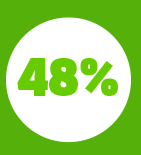 But most importantly:
But most importantly:











